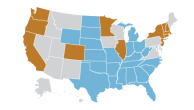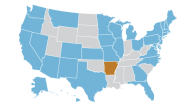Americans’ views about religion in public life are shifting. From February 2024 to February 2025, there was a sharp rise in the share of U.S. adults who say religion is gaining influence in American life.
While this remains a minority view, it is increasingly held by adults across several demographic groups – with gains of at least 10 percentage points among Democrats and Republicans, adults in every age category and in most large religious groups.
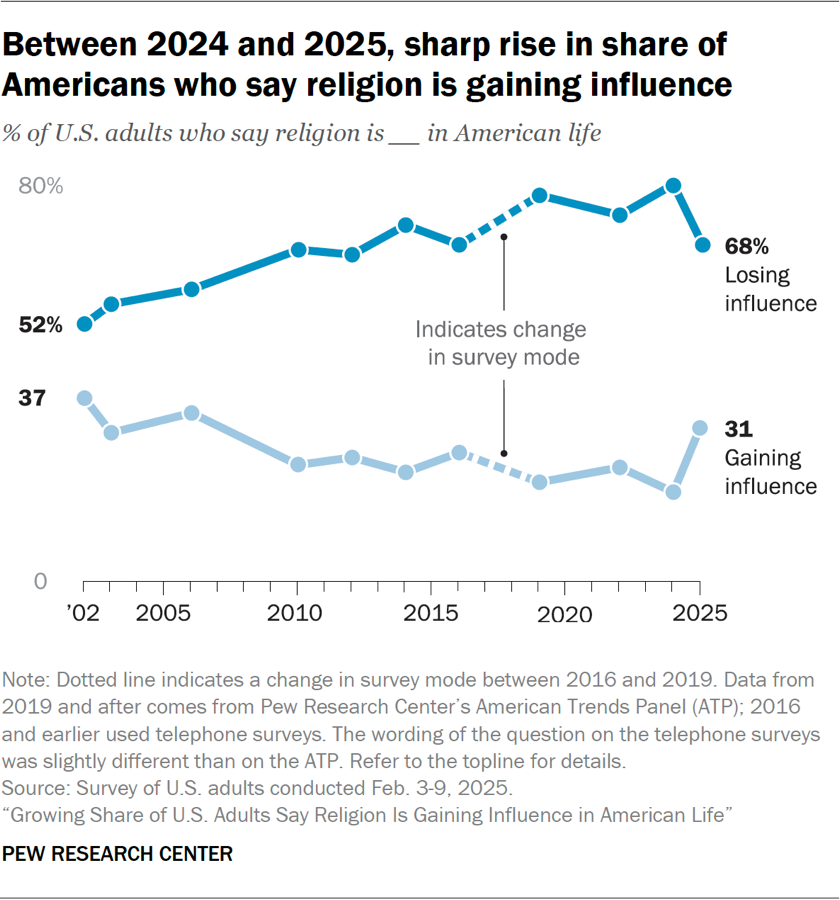
The new survey also finds that in recent years, a growing share of the public takes a positive view of religion’s role in society.
In a February 2024 Pew Research Center poll, 18% of U.S. adults said religion was gaining influence in American life. That was the lowest level we had seen in more than two decades.
A year later, in a February 2025 survey, 31% of U.S. adults said religion was gaining influence in American life – the highest figure we’ve seen in 15 years.
To be sure, most Americans continue to say that religion’s role in society is declining. But the share who take this position fell sharply from 80% in 2024 to 68% in 2025.
After answering the question about whether religion is gaining or losing influence, respondents were asked to evaluate the change they identified – for example, those who said that religion’s influence is declining were asked whether that decline is a good thing or a bad thing.
We combined these questions to estimate how many Americans have a positive view of religion’s influence in society and how many have a negative view.
- Overall, 59% of U.S. adults express a positive view of religion’s influence on American life. Either they say that religion’s influence is growing and this is good, or they say that religion’s influence is declining and this is bad.
- 20% express a negative view. Either they say that religion’s influence is growing and this is bad, or they say that religion’s influence is declining and this is good.
- 21% express neutral or unclear views. They say the changing influence of religion “doesn’t make a difference” in American life, or they declined to answer the questions.

The shares of Americans expressing positive views of religion in 2024 and 2025 are up significantly from 2022 and 2019, indicating an overall shift toward more positive views about religion’s role in American life over the past five years or so.
In addition to larger shares of U.S. adults who say religion is gaining influence and who express positive views about religion, growing percentages say they feel at odds with mainstream American culture because of their religious beliefs.
In 2025, 58% of U.S. adults say there is a great deal or some conflict between their religious beliefs and mainstream culture, up 10 percentage points from 2024 and 16 points from 2020. Feeling at least somewhat in conflict with American culture because of personal religious beliefs is now a majority view.
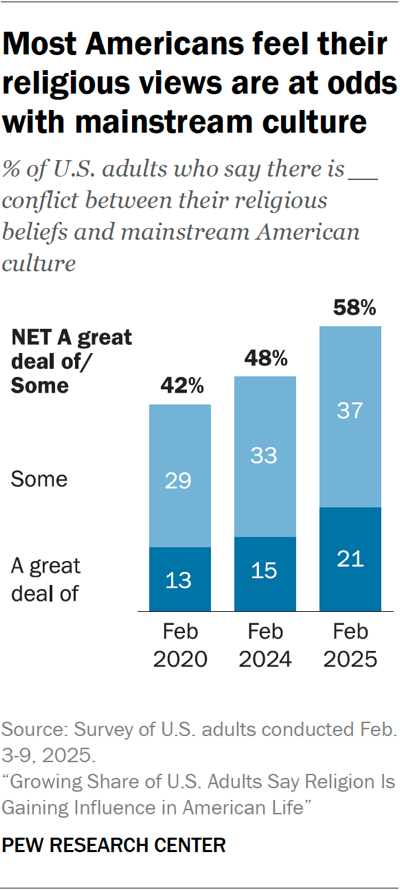
These evolving attitudes on religion in public life appear to be shared widely, rather than confined to specific groups. In recent years, Americans across a variety of religious groups, in both political parties and in all age groups have become more likely to say religion is gaining influence, to express positive views about religion, and to feel that their religious beliefs are at least somewhat in conflict with the mainstream.
These are among the key findings about views of religion in public life from a nationally representative Pew Research Center survey conducted Feb. 3-9, 2025, among 9,544 U.S. adults.
We also asked a few new questions about religion in public life in a separate survey conducted May 5-11, 2025, among 8,937 U.S. adults. Key findings include:
- 29% of Christians say loving your country is essential to what being Christian means to them, while 47% say it is important but not essential and 24% say it isn’t important.
- 48% of Americans say many religions may be true. About a quarter (26%) say only one religion is true, and an additional quarter say there is little truth (18%) or no truth (6%) in any religion.

The rest of this report explores the following questions in detail:
- Is religion gaining or losing influence in American life?
- Is religion’s changing trajectory good or bad?
- Do Americans feel their religious beliefs conflict with mainstream culture?
- How important is ‘loving your country’ to religious identity?
- Is truth found in one religion, many religions or none?
Is religion gaining or losing influence in American life?
Nearly seven-in-ten U.S. adults say religion is losing influence in American life, and about three-in-ten say religion is gaining influence.
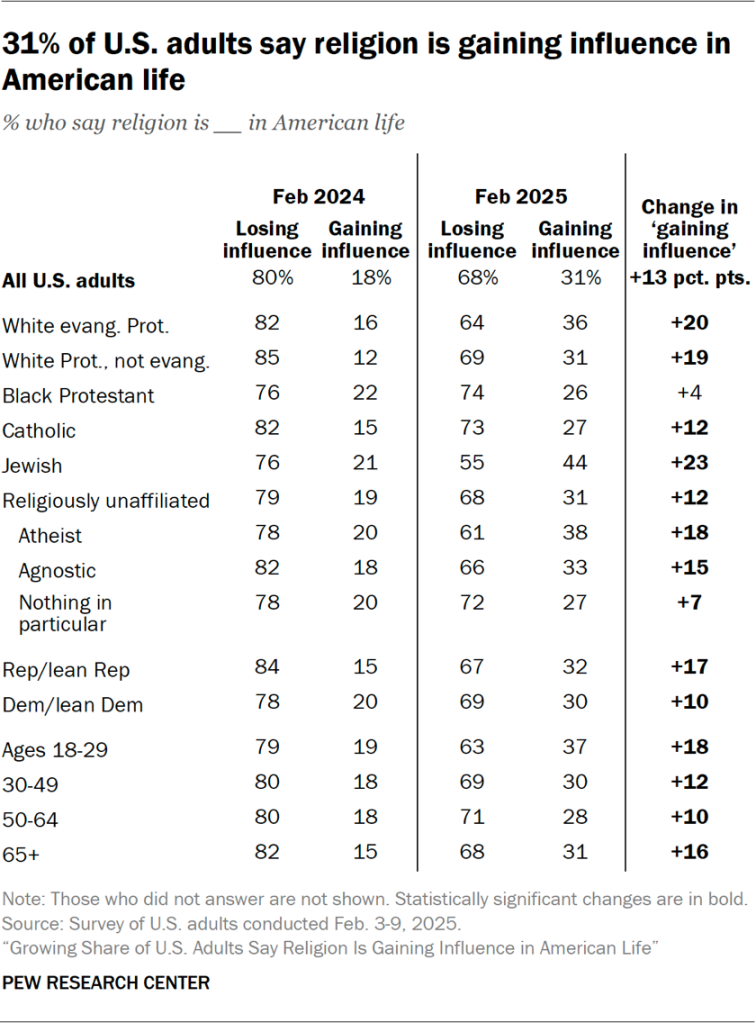
The view that religion is losing influence in American life is a majority position across most large religious groups, political parties and age groups, and it has been for many years.
Jewish Americans are the only group in this analysis without a clear majority saying religion is losing influence: 55% say religion is losing influence, which is not significantly greater than half once the survey’s margins of error are taken into account.
Nevertheless, between 2024 and 2025, nearly all large U.S. religious groups have become more likely to say religion is gaining influence. This shift can be seen – to varying degrees – among religiously affiliated and unaffiliated Americans, Republicans and Democrats, and younger and older Americans.
(Religiously unaffiliated adults – sometimes referred to as “nones” – are those who identify, religiously, as atheist, agnostic or “nothing in particular.”)
Is religion’s changing trajectory good or bad?
After asking respondents whether they think religion is gaining or losing influence in American life, we posed a follow-up question: Is this changing influence a good thing or a bad thing?
We combined these sets of questions to estimate the share of Americans who have a positive view of religion’s influence in society and the share who have a negative view.
About six-in-ten U.S. adults express a positive view of religion by saying either that religion’s influence is declining and this is bad (42%) or its influence is growing and this is good (17%).

One-in-five express a negative view of religion by saying either that its influence is declining and this is good (10%) or by saying its influence is growing and this is bad (10%). One-in-five (21%) say that it doesn’t make much difference whether religion’s influence on American life is growing or declining, or did not answer.
Views among religious, demographic groups
While most Americans express a positive view of religion’s influence in public life, there are sizable differences across demographic groups.
About nine-in-ten White evangelical Protestants (92%) have a positive view of religion’s role in public life. Majorities of Black Protestants (75%), Catholics (71%) and White nonevangelical Protestants (67%) also express positive views of religion.
By contrast, relatively few agnostics (11%) and atheists (6%) have positive views of religion. Most express negative views of religion’s influence in American society.
Jews and people who describe their religion as “nothing in particular” are almost equally split between those who have a positive view of religion and those who have a negative view. A sizable share in each group have a neutral or unclear view.
Republicans and Republican-leaning independents are about twice as likely as Democrats and Democratic leaners to have a positive view of religion (78% vs. 40%).
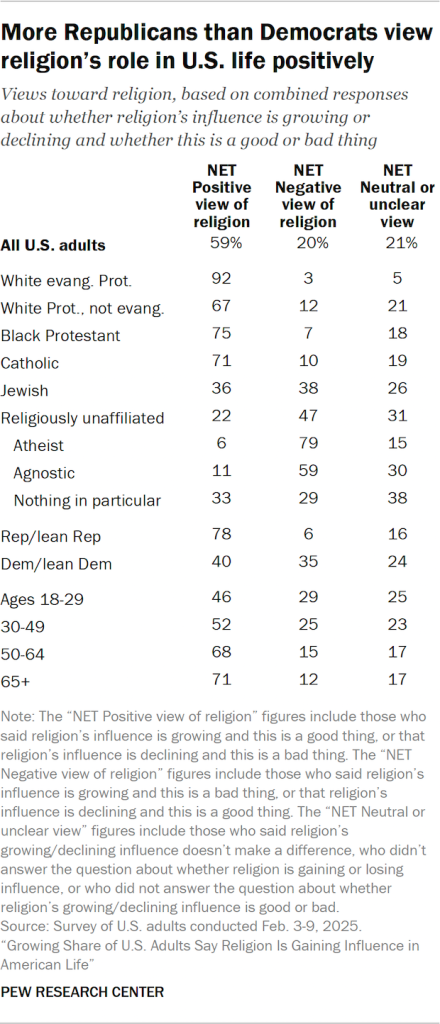
On average, older Americans are more likely than young Americans to express a positive view of religion’s influence in public life. For example, 71% of adults ages 65 and older express a positive view of religion, compared with 46% of 18- to 29-year-olds.
However, compared with 2019, the share of Americans who have a positive view of religion in 2025 is up at least somewhat across all age groups and among people who identify with, or lean toward, both political parties.
Views of Christianity’s influence on American life
The May 2025 survey also asked a question specifically about Christianity’s influence on American life:
- 48% of Americans say Christianity’s influence on American life is decreasing.
- 27% say Christianity’s influence is increasing.
- 24% say Christianity’s influence is not changing very much.
Results on this question are not comparable to the question about religion’s changing influence. The question about Christianity’s influence gave respondents the option of saying its influence is increasing, decreasing or “not changing very much.” By contrast, the broader question about religion’s influence asked people to choose between just two options (“gaining” or “losing”).
Nevertheless, general patterns on these two questions are similar. Like the results on the question about religion’s changing influence, a larger share of Americans now say Christianity’s influence on American life is increasing (27%) than said this in 2020 (19%). But it is still a minority view.
Do Americans feel their religious beliefs conflict with mainstream culture?
Pew Research Center has asked Americans several times in recent years how much conflict – if any – they feel between their religious beliefs and mainstream culture.
For the first time since we began asking this question in 2020, a majority of U.S. adults (58%) say they feel at least some conflict.
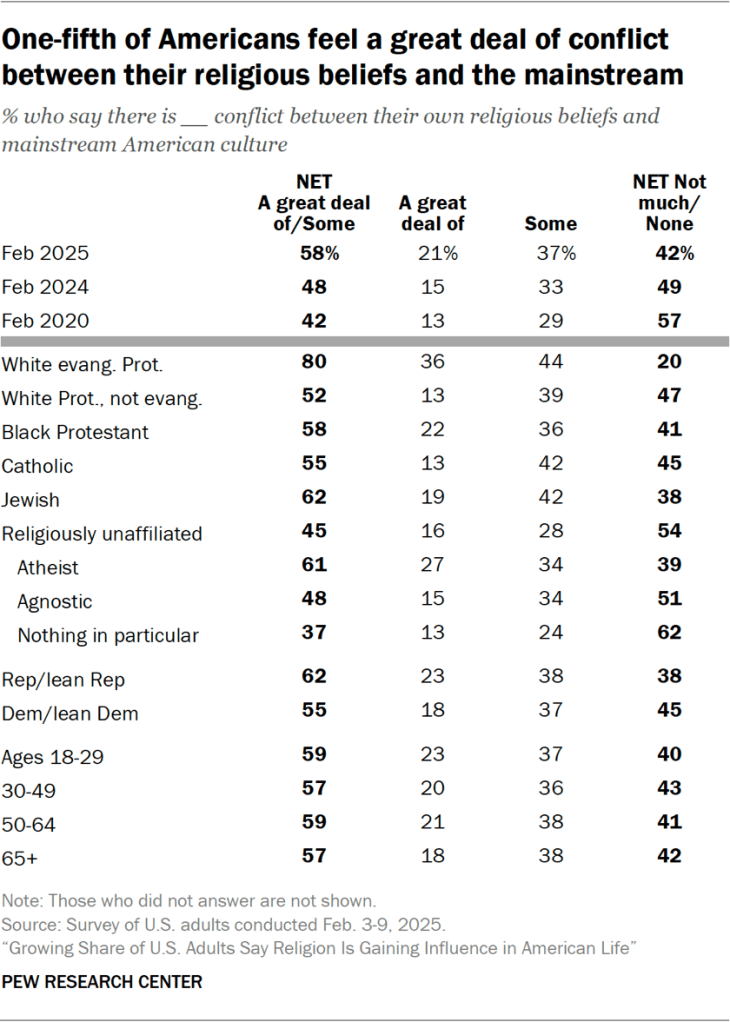
That’s up 10 percentage points from February 2024 and up 16 points from February 2020.
This view is held by roughly half or more of Americans in both political parties and all age groups – and in every religious group analyzed, with the exception of those who say their religion is “nothing in particular.”
Among religious groups large enough to be analyzed, White evangelicals (80%) are by far the most likely to say there is at least some conflict between their religious beliefs and the mainstream.
Meanwhile, 62% of Republicans and 55% of Democrats say there is at least some conflict between their religious beliefs and the mainstream. Compared with the February 2024 survey, the share who feel at least some conflict between their religious beliefs and the mainstream is up 7 points among Republicans and 11 points among Democrats.
How important is ‘loving your country’ to religious identity?
As part of our exploration of views about religion in public life, we also wanted to know to what extent people see loving your country as an important part of their religious identity.
In the May 2025 survey, we offered people a list of traits – including “loving your country” – and asked them how essential these traits are to “being Christian” or “being Jewish” (or in the case of religiously unaffiliated respondents – to being a “good person”).
Other items on the list included traits like “being honest,” “helping those in need,” “being part of a community” and “believing in God.”
Large majorities of Christians say that being honest (86%), treating people with kindness (85%), believing in God (85%), having a personal relationship with Jesus Christ (76%) and helping those in need (66%) are essential to what being Christian means to them.
By contrast, loving your country ranks near the bottom of the list for Christians (29%), alongside attending religious services regularly and continuing family traditions.

Although most Christians do not think loving your country is essential to being Christian, 47% say it is important, even if not essential. About a quarter of Christians (24%) say loving your country is not important to being Christian.
Protestants and Catholics have similar views about whether loving your country is essential to what it means to be a Christian.
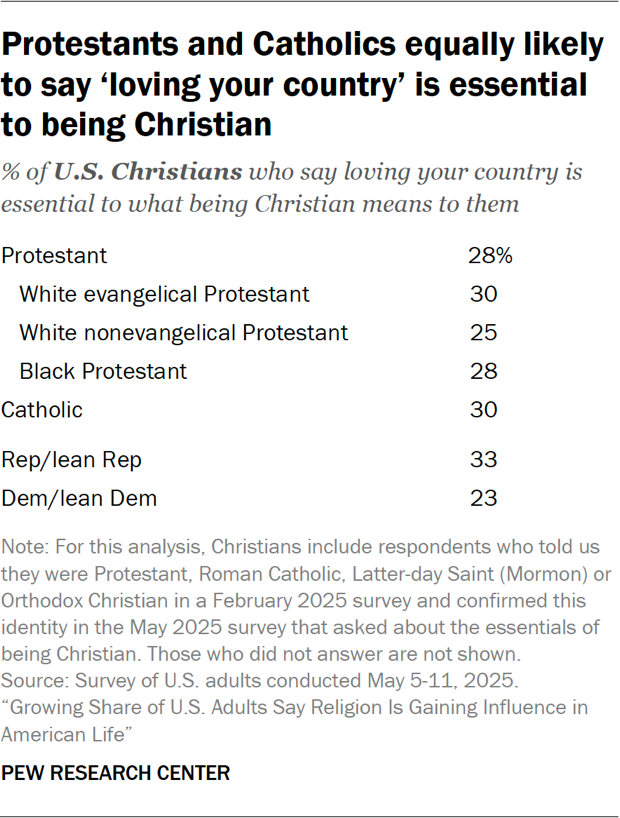
Republican Christians are somewhat more likely than Democratic Christians to say loving your country is essential to being Christian (33% vs. 23%). Still, far fewer than half of Christians in both parties say loving their country is core to their religion.
Among U.S. Jews, 22% say loving your country is essential to Jewish identity, while 32% say it is important but not essential. And 46% say loving your country is not important to being Jewish.
Among religiously unaffiliated Americans, 16% say loving your country is essential to being a good person. An additional 43% say it is important, though not essential. Four-in-ten religiously unaffiliated Americans say loving your country is not important to being a good person.
The survey included respondents of many other religious backgrounds, including members of the Church of Jesus Christ of Latter-day Saints (widely known as Mormons), Muslims, Hindus and Buddhists. But there are not enough respondents from these smaller groups to report on their answers separately.
Is truth found in one religion, many religions or none?
The May 2025 survey also asked U.S. adults whether they believe one religion is true, many religions may be true, or there is little to no truth in any religion.
About a quarter of U.S. adults (26%) believe only one religion is true. Nearly half of Americans (48%) say “many religions may be true.” Another 18% say “there is little truth in any religion.” And 6% say “there is no truth in any religion.”

Clear majorities of White nonevangelical Protestants (69%) and Catholics (65%) say many religions may be true.
By contrast, most White evangelicals (62%) say only one religion is true. White evangelicals are the only religious group large enough to be analyzed in which a majority take this view.
Most atheists and agnostics say there is little or no truth in any religion, and very few say that only one religion is true. But 38% of agnostics say many religions may be true, as do 12% of atheists.
The most common view among both Republicans and Democrats is that many religions may be true (45% and 51% say this, respectively). But Republicans are considerably more likely than Democrats to say only one religion is true (38% vs. 15%), while Democrats are more likely than Republicans to say there is little to no truth in any religion.
Older Americans (ages 50 and older) are more likely than younger Americans to say that many religions may be true. Young adults are somewhat more likely to say there is little or no truth in any religion. (Older Americans are more religious, on average, than younger Americans.)



